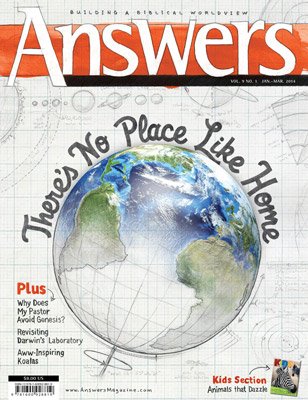Delivering Both Help and Hope
Biblical Worldview
In their rush to avoid any hint of pursuing an empty “social gospel,” many Christians may have missed the mark when it comes to the gospel’s natural outflow—helping people in need. Where’s the right balance?
Some humanitarian organizations are well-known for often filling our television screens with images of the impoverished belly and the sad, tearful eyes of a starving child. For a small regular contribution, you can help provide this child with food, shelter, and access to a decent education until they reach adult life. Is the Christian even concerned about this? After all, people are destined to die once and then face judgment (Hebrews 9:27). Should we bother feeding this child knowing that his or her real problem is spiritual and eternal?
Christians can too easily find themselves on either side of two extreme views: (1) doing works of compassion that do not involve a message of redemption or (2) presenting a message of redemption that trivializes (or even negates) works of compassion. How do we find the right balance?
As in all things, our attitude toward hunger, poverty, and all other social issues must come from the one objective truth in God’s Word. Though it has been said, “Good facts make good ethics,”1 any description of “good” for the Christian is identified only through faith in Christ and in His revealed truth (Romans 14:23). Furthermore, our views toward a lost and suffering humanity are not meant for the easy chair. If our worldview is purely descriptive of our position, it remains impotent (James 2:14–17). One could say that our worldview must have not only a mind but also a heart, arms, and legs.
The Biblical View of Mankind
If we are going to consider our response to the social ills that affect humanity, we must first have a true understanding of humanity. We get this from the Creator Himself and His revelation to us in His Word.
Genesis 1:26–28 recounts a fact of immense social and moral consequence. God created man in His image and after His likeness. One of the first things we notice is the distinction between mankind and the rest of creation. Out of all creation, Genesis specifies only mankind as being made in the image of God. “So God created man in His own image; in the image of God He created him; male and female He created them” (Genesis 1:27). There is no higher honor in creation, and so our view must give humanity the highest possible value.
Throughout Scripture, various references tie the value of humanity to the fact of being created in God’s image. These include why we should not murder another human or even curse another human being with words (Genesis 9:5–6; James 3:8–9). Without this distinction of value uniquely found in our Creator, why should we value humanity higher than any other form of matter? Only within a biblical worldview is human value distinguished by our Creator and to be valued in the highest possible sense.
Most people would agree that there is a moral problem for someone to save the life of a mouse over a human. In a biblical worldview there is reason for a differentiation of human value over all other creatures based on being made in the image of our Creator (Matthew 6:26; Luke 12:24). But it has no logically consistent foundation in an evolutionary worldview. In fact, consistent with the radical implications of her evolutionary worldview, Margaret Sanger, the founder of Planned Parenthood, once stated, “Organized charity itself is the symptom of a malignant social disease . . . our civilization has bred, is breeding, and is perpetuating constantly increasing numbers of defectives, delinquents and dependents.”2
Mankind’s Real Problem
When we see people in hunger and poverty, it’s hard to understand this in light of their being created in God’s image. When looking at our current humanity, we must acknowledge that there has been a devastating effect of sin on humanity bearing the image of God.
Mankind was made to reflect the perfect nature of God’s character, and this character is only consistent with the understanding of a creation in its pre-sin state when there was no death, disease, suffering, or bloodshed. Only as a result of man’s rebellion (sin) is the world groaning in pain, as Paul refers to it in Romans 8:19–22.
Because of that sin, every human is born falling short of his or her calling as an image-bearer to reflect God’s glory. This is humanity’s biggest problem. We suffer the consequences of our sin under the wrath of a righteous Creator.
Even so, it is important to know that human value remains intact. The fact that God is our Maker demands our compassion on the needy (Job 31:13–15), and it makes everyone of equal value, whether rich or poor (Proverbs 22:2).
Our outlook on human value remains at the highest possible levels. This high value does not mean, however, that humanity is good. Since the Fall, the problem of a groaning creation and a fallen humanity can be solved only in the redemption and restoration that comes through Jesus Christ.
An example of a practical outworking of this biblical perspective—combining compassion with our gospel presentation—is a recent initiative that brings together three seemingly unrelated organizations. The publisher of this magazine, Answers in Genesis, has teamed up with the Children’s Hunger Fund and the Slavic Gospel Association to bring both help and hope to a hurting world.
All three organizations desire to help their fellow humans in a way that honors the Creator and puts their biblical worldview in action. Answers in Genesis is writing gospel tracts, The Children’s Hunger Fund is putting together aid packages, and the Slavic Gospel Association is translating and delivering this message of hope and practical help to human beings in need. For more information visit www.answersingenesis.org/go/childrenshungerfund.
Putting Our Worldview in Action
Only in the Bible do we find answers to real-world problems that result in an eternally satisfying solution. The Christian worldview helps the believer understand human value in the context of our greatest need (salvation) and should result in a compassion for hurting people who need this salvation.
A truly biblical worldview is one that honors God in our view of humanity, and delivers both help and hope.
Throughout Scripture we find a call to extend compassion, but the Scripture never calls us to an inadequate end.3 The overwhelming message of Scripture is that humanity needs a Savior, who is Jesus Christ. John the Baptist made this particularly clear in His announcement of Jesus’s coming: “All flesh shall see the salvation of God” (Luke 3:4–6). This is apparent in the ministry of Jesus. Whether it was healing, feeding, or forgiving, Jesus always tied His actions to a call for repentance and faith in Him.
Later John explained that one of the fruits of the gospel is compassion upon fellow humans (Luke 3:10–11; see also Matthew 25:31–40). This principle appears not only here but throughout the Gospels, where we see Jesus constantly authenticating Himself as God and Savior through miracles of compassion (Matthew 11:4–5; Luke 7:22).
Those with a truly biblical worldview have a message that explains the origin of our problems, the true position of humanity, and the real solution that delivers us from our greatest need. With this understanding of human value, Christians should promote avenues to love and reach out to a hurting world, knowing that a human’s need for help is greater than that of every other created thing. The biblical worldview is one that honors God in our view of humanity, and delivers both help and hope.
Christian service is not about creating a better world; nor is it about a message that has no fruit of compassion during its delivery. The gospel is both practiced and spoken. This means the biblical worldview is about having a heart for our fellow humans created in the image of God, with the satisfying end of pointing them to our only real hope of eternal deliverance: repentance and faith in Jesus Christ our Redeemer and King.
Answers Magazine
January – March 2014
Placed safely in our solar system’s “goldilocks zone” and engineered with the perfect balance of atmosphere, chemicals, and water, our earth was miraculously formed to be inhabited (Isaiah 45:18). This issue examines the earth’s unique suitability for life. We’ll also investigate what seminaries are actually teaching our pastors, the possibility that viruses could be beneficial, and more.
Browse IssueFootnotes
- John Jefferson Davis, Evangelical Ethics, 3rd edition (New Jersey: P&R Publishing, 2004).
- Margaret Sanger, The Pivot of Civilization (New York: Brentano’s, 1922), p. 108.
- For further reading see Carl Henry, The Uneasy Conscience of Modern Fundamentalism (Grand Rapids, Eerdmans, 1947).
Recommended Resources

Answers in Genesis is an apologetics ministry, dedicated to helping Christians defend their faith and proclaim the good news of Jesus Christ.
- Customer Service 800.778.3390
- Available Monday–Friday | 9 AM–5 PM ET
- © 2026 Answers in Genesis




